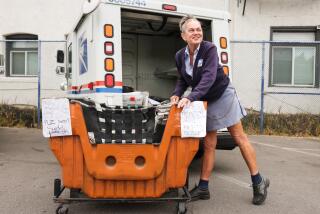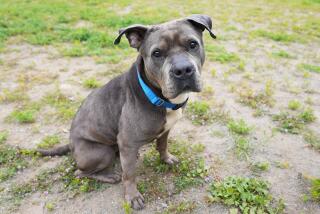Odds of Survival Improve for the U.S. Military’s Best Friends
- Share via
BAGHDAD — Lt. Col. Randall Thompson knows his life has gone to the dogs. But that’s probably a good thing for the Army, the canine corps and for him.
One of only six clinical veterinary surgeons in the U.S. military, Thompson works to save the lives of some of the military’s most valued assets: bombsniffing dogs that have been severely wounded in combat. He arrived here in October to open Iraq’s first urgent surgical care ward for canines.
Before Thompson’s arrival, injured dogs were shipped to a U.S. base in Germany or to the United States for emergency medical treatment. At best, seriously wounded dogs were out of commission for weeks; at worst, they died during transport to a faraway veterinary facility.
The dogs’ talent for sniffing out hidden explosive devices has become crucial to the war effort, so the command changed policy.
“It reached a buildup of dogs here and a concern level that said we had to do something to support these animals the best way possible,” said Thompson, 46, a native of Savannah, Ga. Quicker medical care means the dogs return to duty sooner, he said. “Every day that we can keep a dog out on the line working is another day that a soldier or Marine is going to live because the dog was doing its job.”
By uncovering tons of explosives that insurgents could otherwise use against coalition soldiers, the dogs have saved countless lives, said Col. Arnaldo Claudio, who as 18th Airborne Corps provost marshal commands all military police and dog handlers in Iraq. He declined to disclose the precise number of war dogs here.
“The dogs weren’t needed as much when [the war] started. But the threat has changed,” he said, referring to insurgents’ increasing use of hidden, remote-controlled bombs often fashioned from mortar and artillery shells and detonated by cellphones and pagers. The bombs cause the majority of casualties suffered by U.S.-led forces in Iraq.
Claudio said a bomb-sniffing dog probably saved his life in August when it alerted him and a handler to a roadside bomb at a traffic stop in northern Baghdad.
“We got out of there and the bomb exploded a few minutes later,” Claudio said.
But the dogs and their handlers sometimes pay a steep price. Four-year-old Flapeur was receiving treatment at Thompson’s clinic last month. The Belgian Malinois had taken a piece of shrapnel through the chest in a suicide bombing in the Sunni Triangle city of Ramadi days before. He was on crowd-control duty with two other dogs and their handlers when the bomber struck a line of police recruits.
Flapeur’s handler, a Marine whom the military declined to identify, was also seriously wounded, as was a second handler. Both were airlifted to Germany for medical treatment. The third handler, Marine Sgt. Adam Cann, was killed in the bombing.
Flapeur and the other injured dogs were taken by helicopter to Baghdad’s combat support hospital, just as severely wounded soldiers or Marines would be.
“We would never fly a dog in front of a human casualty. But when there isn’t someone ahead of them, we’ll fly them,” Thompson said.
He and other vets narrowly saved Flapeur, the most severely wounded of the three canines, from dying of shock, blood loss and a collapsed lung. Had the bombing happened before Thompson’s arrival, Flapeur almost certainly would have died.
Although the wound left a nasty-looking hole in his chest, Flapeur was alert and friendly after his treatment. He is expected to be back on duty in three months, as is his handler.
Cann’s dog, Bruno, will go through training again with a new handler. The third dog, Kevin, is expected back on duty as soon as his handler recovers.
A professed dog lover, Thompson says caring for man’s best friend is one of the military’s best jobs. “How many of your other friends listen to you attentively, don’t talk back and are always glad to be in your company?” Thompson said. He has owned dogs, mostly German shepherds, since he can remember, he said. He and his wife have a Labrador retriever and a Cairn terrier.
Most of the dogs used in bomb-detection operations are either German shepherds or Belgian Malinois; they have been trained to detect explosives and to chase down and detain suspects, Thompson said. Just the sight of them usually deters unruly crowds, however.
“It’s the only weapon system we have that you can change your mind on after squeezing the trigger,” Thompson said.
The military dogs here were bought almost exclusively in Europe, where the canines are bred for detection and tracking skills. Then they are sent to Lackland Air Force Base in San Antonio for training. Each dog goes through a six-month course to learn how to sense a dozen or more explosives and weapons.
Dogs that complete the training emerge “more reliable than any chip or software, high-tech machine or robot,” Claudio said.
The training leaves the dogs with an uncanny ability to detect bombs whether underground, behind walls and aboard passing vehicles. The Air Force distributes dogs to all five branches of the armed forces and to the Transportation Security Administration.
After the Sept. 11 attacks, demand for dogs skyrocketed. Lackland now trains 300 animals a year, 40% more than before the attacks. But there still aren’t enough to go around, said Tim Ori, director of operations at the 341st Training Squadron, the unit at Lackland that oversees dog and handler training.
“It is a challenge to fill the demand,” said Air Force Capt. Greg Blaylock, an operations officer with the squadron. Dogs average eight years in active duty, and usually “they retire by being adopted out to former military working dog handlers,” he said.
Thompson says he is thrilled to be here, both because of his love for dogs and because he has wanted to be near a combat zone ever since he joined the Army at 23 after getting his veterinary degree at University of Georgia. Later, the Army sent him for a three-year surgical residency at North Carolina State’s veterinary school.
He was turned down for duty in Somalia and Operation Desert Storm, partly because his skills were needed elsewhere.
“I was frustrated about not getting proximity to a battlefield,” Thompson said. “Now I don’t think there is a more important job for a veterinarian anywhere in the Army than they one I have here right now.”
More to Read
Sign up for Essential California
The most important California stories and recommendations in your inbox every morning.
You may occasionally receive promotional content from the Los Angeles Times.










